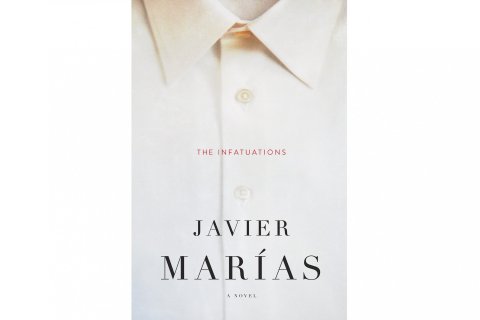Reading Javier Marías is like a conversation that you didn't want to have. But the speaker is so elegant, so puissant beneath his Old World clothes, so innocently macho with all his philosophical conundrums, that you let him talk. You let him tell you things you wish you'd never heard. He could be the devil himself but for something generous in his address, a focus outside himself. He is not dangerous. And yet his sobriety—a sobriety that sits unmoved amid endlessly unfurling sentences, sentences that in any other writer's hands might foam into frantic sub-Dostoevskian ranting—betrays lethal knowledge. Or lethal tastes, at least, an aficionado's relish for gore, for poise, for heroism. Beneath the dilating, open-ended, inquisitive, and self-contradicting sentences there may even be a boyish eagerness.
It is characteristic that in the perennial Nobel candidate's latest novel, The Infatuations, the three works constantly alluded to are The Three Musketeers, Macbeth, and Balzac's Colonel Chabert. These three works are chosen for precise thematic reasons, but if you are new to Marías, pause just for a moment to consider how dashing these works are, how prone to mustaches and passementerie, how almost camp their idea of evil is.
The unspoken romance at the heart of Marías's work is the recuperation of old-fashioned adventure within perfectly serious, cerebral contemporary fiction. This has been true since the Spanish author's breakthrough novel, A Heart So White (1992), and certainly applies to the monumentally satisfying Your Face Tomorrow trilogy (2002–07), a combination spy thriller–modernist masterpiece. As Marías himself has admitted, the action in his books often comes to a complete stop, and whole chapters are filled up with nothing but what he calls "literary thinking." A character ruminates, turns a problem over and over, comes like a mesmerized tourist onto unanticipated vistas, or, just as frequently, pauses where he is and considers the forking paths before him.

And yet the new book, like many of his best, begins with action. A Madrid man, innocent and well liked, is stabbed to death by a homeless man in an apparently random act of violence. The book's first sentence, though ripe with the questions and qualifications that fill out Marías's books, has a hook worthy of an airport crime novel.
"The last time I saw Miguel Desvern or Deverne was also the last time that his wife, Luisa, saw him, which seemed strange, perhaps unfair, given that she was his wife, while I, on the other hand, was a person he had never met, a woman with whom he had never exchanged so much as a single word."
María, the book's scrupulous narrator, works at a Madrid publishing house and every morning at the neighborhood café observes Miguel with his wife, Luisa, both known to her at first only as "a perfect couple." She reads of Miguel's death in the papers. When Luisa finally makes a reappearance at the café, the narrator approaches and offers her condolences—and learns that the perfect couple had a name for her, too: "the Prudent Young Woman."
She will, by book's end, know far more about Miguel's death than the widowed Luisa—and will keep it to herself less out of prudence than out of some deeper, darker, more profoundly Marías-esque ambivalence. Who am I, she asks, "to impose a revelation on someone"?
Considering the revelations that have been imposed on her, this is an understandable scruple. First, Luisa sets her down and talks for a few hours. Since her husband's death, she tells María, she has acquired "an unfamiliar, alien mentality," and can't stop reimagining the murder. She offers a pages-long transcript of what her husband might have been thinking as he died.
She complains that people too often discount the past: "Yes, that's what most people believe. That what has ceased to happen is not as bad as what is happening, and that we should find relief in that cessation." But for her the past is on repeat, like an animated GIF. "They mean well, but they don't understand that all my memories are now soiled by that sad and bloody ending ... I don't really have any good memories left. They all seem false to me. They've all been contaminated." In María's mind, the cud-chewing mind of the quintessentially ruminative Marías narrator, this line of thought reaches a pitch of existential keening:
"What's the point of this and why bother with that, what's the point of money or a business and all its complications, why a house and a library, why go out to work and make plans, why have children, why anything? Nothing lasts long enough because everything ends and, once it's over, it was never enough, even if it lasted a hundred years."
Against this astonishing logic, Miguel's best friend Díaz-Varela speaks up for being realistic. He wants Luisa to get over her loss—indeed, as he lets María know, he wants to marry the widowed Luisa himself, once she is ready. Yet his philosophy of life is the opposite of the widow's. "That's the mistake most people make," he tells the narrator.
"The mistake of believing that the present is forever, that what happens in each moment is definitive, when we should all know that as long as we still have a little time left, nothing is definitive. We have all experienced enough twists and turns, not just in terms of luck but as regards our state of mind. We gradually learn that what seems really important now will one day seem a mere fact, a neutral piece of information."
The consolations of this philosophy begin to feel a little sinister after María begins to suspect that Díaz-Varela may have arranged Miguel's murder. He may be not only asking Luisa to forget her husband, but he may also be asking María to forget certain suspicious facts. It won't be giving too much of the plot away to say that there is even a moment when the reader is allowed to imagine that Miguel himself, perhaps terminally ill, had asked to be assassinated, that his final thoughts might not, as his widow imagines, have been directed toward her but toward the absurd gratification of a favor done him in the form of multiple stab wounds, delivered him by his best friend through the medium of a homeless man's butterfly knife.

All of this will sound constructed, too full of symmetries and plot twists and staged confessions. What makes The Infatuations more than a thought experiment dressed up with daggers and wicked liaisons is its irresolution. Díaz-Varela, who steals the book much as the Grand Inquisitor steals The Brothers Karamazov, puts it this way when discussing Balzac:
"It's a novel, and once you've finished a novel, what happened in it is of little importance and soon forgotten. What matters are the possibilities and ideas that the novel's imaginary plot communicates to us and infuses us with."
So if, at the novel's end, the widowed Luisa were to forget Miguel and happily remarry, it might theoretically prove Díaz-Varela right. But such a tiny scene, at the end of such a deep, thoroughgoing novel, would hardly replace or supplant the many vistas on life and death opened during the (hopefully unhurried) experience of reading it.
The Infatuations may not have the grandiosity of his preceding book, the three-volume Your Face Tomorrow. That book, in its first and second volumes, felt grandly like it would never end. The Infatuations is more formally balanced. It feels like Marías is headed toward a late style, brainy and lean and a little dry. The tinge of blood that flavors all of Marías's novels is here, but the use of a female narrator slightly inhibits Marías's boyish relish. Perhaps that is for the best. The book teaches us to somehow dread the idea that life belongs to the living—that transcendental moments do not exist, that time is on the side of murderers.

























